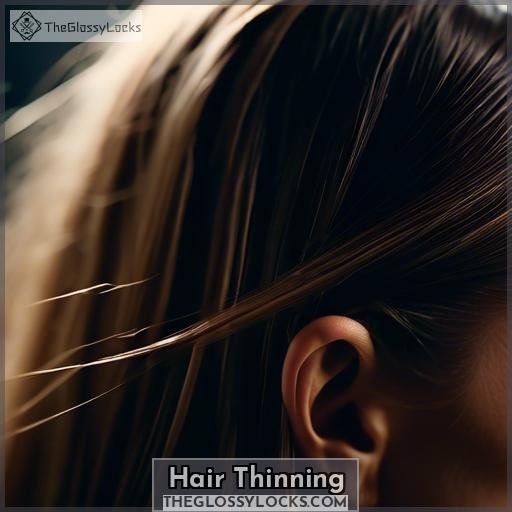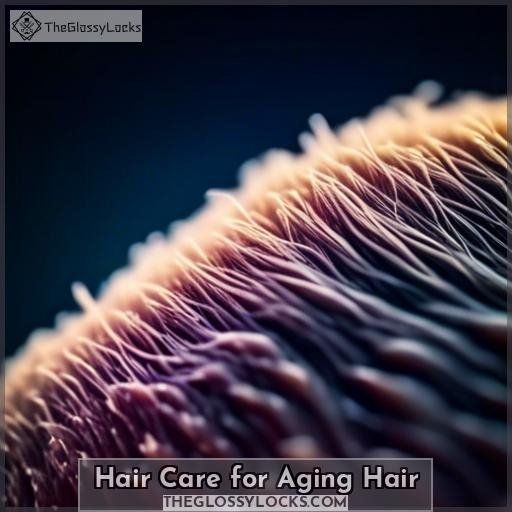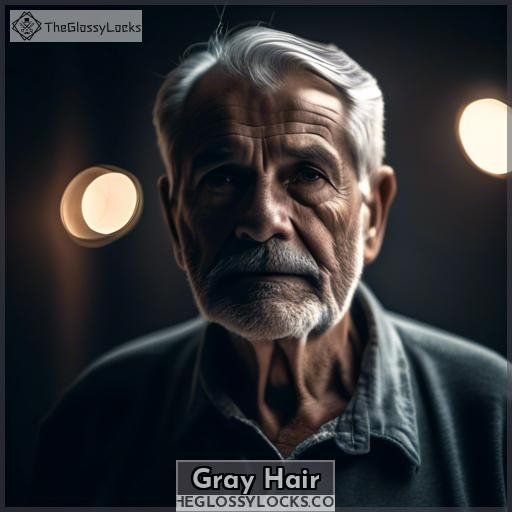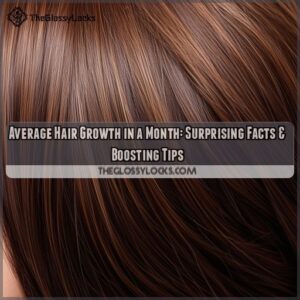This site is supported by our readers. We may earn a commission, at no cost to you, if you purchase through links.
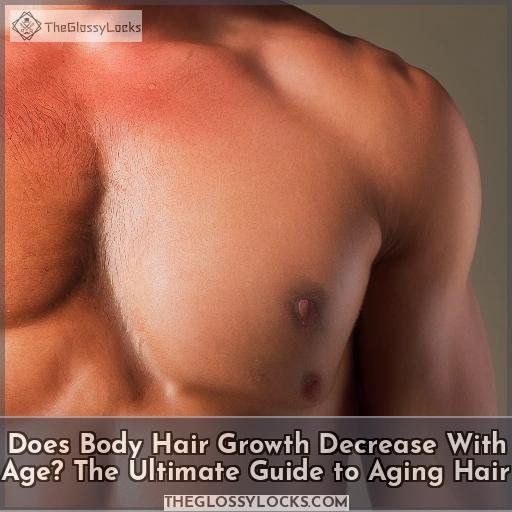 Yes, body hair growth does decrease with age. As you get older, your hair follicles become smaller, and the growth phase (anagen) shortens, leading to thinner, sparser hair. Additionally, sebum production declines, resulting in drier, duller body hair. Hair loss is common with aging, and you may notice a decrease in hair density or even miniaturized follicles that stop producing new hair.
Yes, body hair growth does decrease with age. As you get older, your hair follicles become smaller, and the growth phase (anagen) shortens, leading to thinner, sparser hair. Additionally, sebum production declines, resulting in drier, duller body hair. Hair loss is common with aging, and you may notice a decrease in hair density or even miniaturized follicles that stop producing new hair.
While some shedding is normal, significant thinning could indicate an underlying condition. To better understand the changes in body hair growth with age and how to care for maturing hair, let’s explore this topic further.
Table Of Contents
- Key Takeaways
- Does Body Hair Growth Decrease With Age?
- Hair Thinning
- Anagen Phase Shortens, Leading to Thinner Hair
- Hair Diameter Decreases
- Sebum Production Declines, Resulting in Duller, Less Soft Hair
- Hair Density Decreases
- Follicles May Stop Producing New Hair
- Aging is a Common Cause of Hair Loss (alopecia Areata)
- Normal to Lose 50-100 Hairs Daily
- Male Pattern Baldness Affects People Assigned Male at Birth (AMAB)
- Female Pattern Baldness Affects People Assigned Female at Birth (AFAB)
- Stress Can Contribute to Hair Loss
- Hair Loss
- Hair Care for Aging Hair
- Hair Types
- Shampoo and Conditioner
- Straight and Wavy Hair
- Curly and Coily Hair
- Gray Hair
- Frequently Asked Questions (FAQs)
- Conclusion
Key Takeaways
- Hair growth decreases with age due to a shortening anagen phase, decreased hair diameter, and reduced sebum production.
- Maintaining a healthy scalp, using gentle shampoos and conditioners, and protecting hair from the sun can help combat the effects of aging on hair.
- Hair loss can be a sign of aging or stress, and excessive hair loss may indicate underlying medical conditions.
- Genetics play a significant role in when hair begins to gray, and maintaining overall hair health through proper care and lifestyle choices is essential.
Does Body Hair Growth Decrease With Age?
Yes, body hair growth does decrease with age due to hormonal changes and the thinning of skin and hair follicles.
Hair Thinning
As you age, your hair will naturally start to thin. This is because the anagen phase, or growth phase, of your hair will shorten, and the follicles will start to produce less hair.
Anagen Phase Shortens, Leading to Thinner Hair
As you age, your hair growth cycle changes.
The anagen phase, which is the growth phase, shortens, leading to thinner hair.
Your hair diameter decreases, and sebum production declines, making your hair less soft and shiny.
Your hair density also decreases, and follicles may stop producing new hair.
This is a common cause of hair loss, known as alopecia areata.
It’s normal to lose 50-100 hairs daily, but excessive hair loss can be a sign of aging or stress.
Understanding these changes in your hair growth is key to maintaining healthy, aging hair.
Hair Diameter Decreases
As you age, your hair diameter decreases, leading to thinner hair. This change begins around age 25 and continues throughout your life. The decrease in hair diameter isn’t uniform across all individuals, with some studies reporting a significant decrease after 40 years of age in Japanese women.
This reduction in hair diameter is a normal part of the aging process and is influenced by genetic factors.
- Maintain a healthy scalp by washing with gentle shampoos and conditioners.
- Use hair care products that are suitable for your hair type, such as texture sprays for straight and wavy hair, and moisture-focused products for curly and coily hair.
- Camouflage gray hair with root touch-ups or professional dyeing.
- Focus on moisture for curly and coily hair, as these hair types are prone to dryness and breakage.
Sebum Production Declines, Resulting in Duller, Less Soft Hair
As we age, sebum production in our hair follicles declines, leading to duller, less soft hair.
This change in hair texture can be frustrating, especially for those who value shiny, healthy-looking hair.
To combat this, it’s crucial to maintain a healthy scalp and use gentle shampoos and conditioners.
Additionally, protecting your hair from sun exposure and avoiding harsh chemicals and heat styling can help preserve its softness and shine.
Hair Density Decreases
As we age, our hair density decreases, leading to thinning hair. This is due to a combination of factors, including reduced melanin production, slower growth, and reduced protein strands. Hair follicles may stop producing new hair, and the anagen phase becomes shorter, leading to thinner hair. This process is known as hair miniaturization and is a common sign of androgenic alopecia, which can affect both men and women.
Here are three key points to understand about hair density decline:
- Reduced melanin production: As we age, the production of melanin, the pigment responsible for hair color, decreases, leading to gray hair.
- Slower growth and reduced protein strands: With age, hair growth slows down, and the protein strands that make up our hair become less robust, leading to thinner hair.
- Hormonal changes: Hormonal fluctuations, such as those associated with menopause or pregnancy, can affect hair density and cause hair loss.
To maintain healthy hair as we age, it’s essential to adopt a gentle hair care routine, avoid harsh chemicals and heat styling, and protect hair from sun exposure. Regularly trimming and cleaning nails is also crucial for maintaining their health.
Follicles May Stop Producing New Hair
As you age, your hair’s growth spurt might hit the brakes, and some follicles may call it quits, leaving you with thinner locks.
It’s like your personal account of hair is seeing more withdrawals than deposits.
But don’t fret; options like hair extensions or a splash of color can add volume and vibrancy, turning back the clock on graying, thinning hair.
Aging is a Common Cause of Hair Loss (alopecia Areata)
As you age, you may notice changes in your hair, such as thinning and hair loss. Aging is a common cause of hair loss, also known as alopecia areata. This condition can be caused by a variety of factors, including hormonal changes, reduced blood circulation to the scalp, and autoimmune processes.
Hair loss can be distressing, but there are treatments available to help. Minoxidil, a topical medication, is FDA-approved and has been shown to be effective in promoting hair growth in both men and women. Other treatments, such as serums and shampoos containing natural ingredients, can also be helpful.
If you’re experiencing hair loss, it’s important to consult with a healthcare professional to determine the underlying cause and develop an appropriate treatment plan. In some cases, hair loss may be a sign of an underlying health condition, such as an autoimmune disorder or a nutritional deficiency.
Normal to Lose 50-100 Hairs Daily
Normal hair loss is a natural part of the hair growth cycle. Most people lose between 50 to 100 hairs daily.
However, if you’re losing more than this amount, it could be a sign of underlying medical conditions or hormonal changes, such as alopecia areata. Alopecia areata is an immune system-related condition causing patchy hair loss.
It’s essential to consult a healthcare professional to rule out any underlying medical conditions before exploring hair loss treatments or prevention methods.
Male Pattern Baldness Affects People Assigned Male at Birth (AMAB)
As you age, you may notice changes in your body hair growth. Hair loss and thinning can occur due to a variety of factors, including hormonal influences, genetic factors, stress, and other health issues. Male pattern baldness, also known as androgenetic alopecia, affects many men by the age of 60. This type of hair loss is characterized by a shortening of the anagen phase, leading to thinner hair, a decrease in hair diameter, and a reduction in sebum production, resulting in duller, less soft hair.
For people assigned male at birth (AMAB), male pattern baldness is a common cause of hair loss. This condition is influenced by genetics and hormonal changes, particularly the conversion of testosterone to dihydrotestosterone (DHT). DHT is responsible for the miniaturization of hair follicles, leading to shorter, thinner hairs over time.
To address hair loss and thinning, consider the following hair growth treatment tips:
- Maintain a healthy scalp: Ensure your scalp is clean and well-nourished to support healthy hair growth.
- Use gentle shampoos and conditioners: Opt for products that are specifically designed for aging hair, as they may contain ingredients that help strengthen and protect your hair.
- Protect your hair from the sun: Wear a hat or use a protective product to shield your hair from harmful UV rays.
- Keep your hair moisturized: Use hair masks and conditioners to add moisture and prevent breakage.
- Consider hair growth treatments: Consult with a healthcare professional or dermatologist to discuss potential treatments, such as minoxidil or finasteride, which may help slow down hair loss and promote regrowth.
Female Pattern Baldness Affects People Assigned Female at Birth (AFAB)
You’re not imagining it—your mane might be thinning. It’s a common twist of fate for many individuals assigned female at birth as the years tick by.
Hormonal shifts can send your scalp’s lush landscape into retreat, but fear not. A savvy mix of hair care and styling tricks can keep your tresses looking voluminous.
Embrace the change; after all, it’s just another strand in life’s rich tapestry.
Stress Can Contribute to Hair Loss
Stress can contribute to hair loss, and it’s essential to understand how cortisol, a stress hormone, is involved in this process. Cortisol can impact hair growth both directly and indirectly. Directly, it might affect the hair follicles, and indirectly, it can impair the production of other hormones needed for hair growth. Additionally, cortisol’s involvement in certain illnesses that can cause hair loss, such as alopecia areata, shouldn’t be overlooked.
Stress can lead to a condition called telogen effluvium, where hair follicles enter a prolonged resting phase, and after several months, the affected follicles might fall out without notice when you’re combing or brushing your hair. Stress can also worsen flares of alopecia areata, a patchy form of hair loss associated with autoimmune dysfunction.
To manage stress and its impact on hair loss, consider lifestyle changes such as exercise, relaxation techniques like yoga or meditation, and adequate sleep. Maintaining a healthy diet rich in nutrients that support hair health is also crucial.
Hair Loss
Gray hair occurs when melanin is absent, which can indicate nutritional deficiencies or health conditions. Similarly, lengthwise ridges in fingernails may also signal underlying health issues.
Gray Hair Occurs When Melanin is Absent
Gray hair occurs when melanin, the pigment responsible for hair color, is absent. This can be caused by a decrease in melanin production due to aging or genetic factors.
- Healthy Hair Habits: Avoid excessive use of heat and chemical treatments, which can damage hair and pigment cells.
- Diet: Eat a nutrient-rich diet to supply the body with essential vitamins and minerals for healthy hair growth.
- Stress Management: Reduce stress to minimize its impact on hair pigmentation.
- Supplements: Consult your doctor about supplements that may stimulate hair growth and address any potential deficiencies.
Additionally, avoid harsh hair products that can decrease melanin production, such as hydrogen peroxide, and opt for natural, non-damaging alternatives. Remember, genetics play a significant role in when hair begins to gray, so it’s essential to maintain overall hair health through proper care and lifestyle choices.
Gray Hair May Indicate Nutritional Deficiencies or Health Conditions
Gray hair may indicate nutritional deficiencies or health conditions.
As you age, your hair may start to gray due to reduced melanin production.
However, gray hair can also be a sign of underlying health issues or nutritional deficiencies.
Additionally, certain health conditions, such as thyroid disorders, can also lead to gray hair.
Men and women may both experience gray hair as they age.
It’s not merely a cosmetic concern.
It’s advisable to consult a healthcare professional if you notice sudden or excessive graying, as it could be a sign of a more serious issue.
Lengthwise Ridges in Fingernails Can Indicate Nutritional Deficiencies or Health Conditions
As you age, your body undergoes various changes, including changes in your hair and nails. While hair loss and graying are common, your nails may also change, becoming brittle, dull, and showing lengthwise ridges. These changes can be indicative of nutritional deficiencies or health conditions. For instance, horizontal ridges, known as Beau’s lines, can be a sign of an underlying illness or injury that has interrupted your nail growth. Vertical ridges, on the other hand, can be a result of aging or a sign of a more serious condition that may require medical attention.
To maintain healthy nails, it’s essential to avoid harsh chemicals and heat styling. Opt for gentle shampoos and conditioners that are free of harsh ingredients, and protect your nails from the sun. Keep your nails trimmed and clean, and avoid biting or picking them. If you choose to wear nail polish, opt for removers without acetone, as these are less harsh on your nails.
In addition to these tips, it’s crucial to maintain a balanced diet rich in nutrients like zinc and vitamin D, which are essential for nail health. Regular exercise and adequate sleep can also contribute to overall health and nail strength. By taking these steps, you can help mitigate the effects of aging on your hair and nails, ensuring they remain healthy and strong.
Hair Care for Aging Hair
As we age, our hair health and scalp care become more crucial. To maintain healthy aging hair, it’s essential to focus on moisture retention and use the right products.
- Hair Health: Use gentle shampoos and conditioners that are specifically designed for aging hair. Avoid harsh chemicals and heat styling, which can damage your hair further.
- Scalp Care: Keep your scalp clean and hydrated. Regularly massage your scalp to improve blood flow and stimulate hair growth.
- Moisture Retention: Focus on products that provide moisture to your hair. This can help combat dryness and breakage caused by aging.
- Product Recommendations: Look for hair masks and conditioners that contain ingredients like hydrolyzed keratin, olive oil, or shea butter. These ingredients can help improve the overall health of your hair.
Hair Types
Hair’s texture changes with age, whether it’s fine or thick, straight or curly. Type 1 hair tends to become curlier, while Type 3 curls may loosen.
Fine, Medium, Thick Thickness
As you age, you may notice changes in the texture and thickness of your hair. Fine hair, with the smallest circumference, can feel like feathers and reflect light better than other hair textures. Medium hair, the most common type, is neither super soft nor rough to the touch and has lots of body and bounce. Thick hair, with the largest circumference, can feel heavy and rough and may contain three distinct layers known as the medulla, cortex, and cuticle.
These differences in hair thickness can impact how your hair looks and behaves as you age. Fine hair may become even thinner and more fragile, while thick hair may become coarser and more difficult to manage. Understanding your hair type can help you choose the right hair care products and styling techniques to maintain healthy, beautiful hair as you age.
Straight, Wavy, Curly, Coils Curl Pattern
As we age, our hair types can change too. Understanding your curl pattern is key to maintaining healthy, vibrant locks.
- Straight hair: Becomes curlier with age, and may lose its shine and softness.
- Wavy hair: May have multiple curl patterns, and can become less defined over time.
- Curly hair: Curls may loosen or drop with age, leading to dryness and breakage.
- Coily hair: Prone to dryness and breakage, and lacks shine and smoothness.
Type 1 (straight): Becomes Curlier With Age, Duller and Drier
As you age, your hair may change in texture, becoming curlier, coarser, and less manageable. This change is due to hormonal shifts that can alter the shape and pattern of your hair follicles.
The hormonal changes that occur during puberty, pregnancy, and menopause can cause your hair to transform from straight to curly.
To maintain healthy aging hair, it’s essential to use gentle shampoos and conditioners, avoid harsh chemicals and heat styling, and protect your hair from the sun.
It’s also crucial to keep your nails trimmed and clean and avoid biting or picking at them.
Type 2 (wavy): May Have Multiple Curl Patterns
Wavy hair patterns are as unpredictable as a weather forecast, often sporting multiple curl patterns that can leave you guessing. As you age, don’t be surprised if your waves start loosening or dropping, like leaves in autumn.
Keeping your hair’s moisture levels in check is your secret weapon, ensuring those waves ride high and mighty, no matter the season.
Type 3 (curly): Curls May Loosen or Drop With Age
As you age, don’t be surprised if your once tight curls start loosening their grip or even dropping their bounce.
It’s like your hair decides to relax a bit more with each passing year.
Think of it as your curls mellowing out, embracing a more laid-back vibe.
It’s a natural part of the hair’s journey, adapting and changing as you do.
Type 4 (coils): Prone to Dryness and Breakage, Lacks Shine and Smoothness
As your hair ages, it becomes more prone to dryness and breakage, especially for those with type 4 coils. This is because the hair is naturally coarse and has fewer cuticle layers, making it more susceptible to damage.
To combat these issues, it’s essential to be gentle with your hair and avoid harsh chemicals and heat styling. Opt for sulfate-free shampoos and conditioners, and use products specifically designed for coily hair.
Regular deep conditioning treatments can also help keep your hair moisturized and healthy.
It’s also crucial to avoid over-washing your hair, as this can strip it of its natural oils, leading to dryness.
Additionally, using a pre-poo treatment before washing can help soften your strands and prevent breakage.
Shampoo and Conditioner
To care for aging hair, you’ll need the right shampoo and conditioner. Choose shampoos with natural oils like argan and coconut, and complement them with conditioners containing hydrolyzed keratin (protein), olive oil, or shea butter.
Use Shampoos With Natural Oils Like Argan and Coconut
Switching to shampoos with natural oils like argan and coconut can be a game-changer for aging hair.
These oils provide hydration and moisture, nourish and repair hair, and protect it from damage caused by heat styling tools, environmental factors, and chemical treatments.
Using hair masks with these natural oils can further enhance their benefits, adding moisture to your hair.
Conditioners With Hydrolyzed Keratin (protein), Oil Olive, or Shea Butter
Conditioners with hydrolyzed keratin, oil olive, or shea butter can work wonders for aging hair.
- Hydrolyzed Keratin: This protein strengthens hair, making it less prone to breakage and damage.
- Oil Olive: Rich in antioxidants, it nourishes hair and helps maintain its natural shine.
- Shea Butter: Known for its moisturizing properties, it hydrates hair and enhances its elasticity.
- Hair Masks: Regular use of hair masks can provide an extra boost of hydration and nutrition to aging hair.
Hair Masks for Adding Moisture
Hair masks are a great way to hydrate and nourish your hair, especially as you age. They can help combat the dryness and brittleness that comes with time, leaving your hair looking and feeling healthier.
- Choose the Right Mask: Look for a hair mask that suits your hair type and condition. If your hair is dry or brittle, opt for a thicker, hydrating mask with ingredients like ceramides or coconut water. For thinner hair, choose a lighter weight volumizing option with ingredients like caffeine.
- Prep Your Hair: Wash your hair with a mild, cleansing shampoo to remove any debris or residue. Towel-dry your hair until it’s damp, as hair masks work best on damp hair.
- Apply the Mask: Take a generous amount of the hair mask and distribute it evenly throughout your hair, focusing on the mid-lengths and ends. Avoid applying the mask to your scalp unless the product specifies otherwise. Use a wide-toothed comb to ensure even distribution.
- Massage and Relax: Gently massage your scalp using your fingertips to improve blood circulation and promote hair growth. If you have extra time, you can wrap your hair in a warm towel or use a shower cap to create heat, allowing the mask to penetrate deeper.
- Rinse and Condition: After the recommended time (usually around 15-30 minutes), rinse the mask out with lukewarm water. Follow up with a hydrating conditioner to seal in moisture.
- Style as Desired: Once you’ve rinsed and conditioned, style your hair as desired. Whether you choose to air dry or use heat styling tools, your hair will look and feel more manageable and healthy after using a hair mask.
Straight and Wavy Hair
If you have straight or wavy hair, avoid using heavy products that can weigh your hair down.
Avoid Heavy Products
As we age, our hair changes, and it’s essential to adapt our hair care routine to maintain healthy locks. To avoid heavy products, choose sulfate-free and paraben-free shampoos. Additionally, avoid heat styling and deep condition regularly. By making these simple adjustments, you’ll be able to navigate the complexities of aging hair with ease.
Use Texture Sprays
As you age, your hair may lose its luster and volume.
To enhance your locks, consider using texture sprays. These lightweight products can add body and bounce to your hair, making it look fuller and more vibrant.
Whether you’re seeking a quick root touch-up or a professional dye job, texture sprays are a versatile addition to your hair care routine.
Embrace the ever-evolving world of hair products and unlock the secrets to maintaining your locks as you age.
Curly and Coily Hair
For luscious, healthy curls and coils as you age, prioritize moisture. Embrace products specially formulated for your unique hair type to maintain its vibrancy and vitality.
Focus on Moisture
As we age, our hair can become dry and brittle, especially for those with curly and coily textures.
To keep your hair hydrated and healthy, incorporate deep conditioning treatments, leave-in treatments, and moisturizing shampoos into your routine.
Hydrating masks and nourishing oils can also provide an extra boost of moisture.
Use Products Designed for Curly Hair
To keep your curly hair moisturized and prevent breakage, it’s essential to use products specifically designed for curly hair. These products are formulated to address the unique needs of curly hair, such as adding moisture, strengthening the hair, and preventing damage.
- Moisturizing Shampoo and Conditioner: Start with a moisturizing shampoo and conditioner that’s gentle and suitable for your hair type. These products will help hydrate your curls and keep them soft and manageable.
- Deep Conditioning Treatments: Regular deep conditioning treatments can help repair and hydrate dry hair, reducing the risk of breakage. Look for products that are rich in nourishing ingredients like shea butter or coconut oil, which can help seal in moisture and prevent dryness.
- Leave-in Conditioners: Apply a leave-in conditioner to damp hair after washing. This will help maintain moisture throughout the day and prevent breakage. Choose a leave-in conditioner that’s lightweight and suitable for your hair type.
Gray Hair
As you age, you may notice changes in your hair, including graying and thinning. Graying occurs due to reduced melanin production, which is the pigment responsible for hair color. This process is influenced by genetics and can begin as early as your 30s. Thinning hair is also a common occurrence, with follicles stopping the production of new hair and hair density decreasing.
To care for your aging hair, it’s essential to maintain a healthy scalp and use gentle shampoos and conditioners. For gray hair, consider using products designed to enhance its natural color or camouflage roots with root touch-ups or professional dyeing. Additionally, focus on moisture for curly and coily hair and select formulas suited for fragile or colored hair.
Remember that hair changes are a natural part of aging, and it’s essential to embrace these changes and adapt your hair care routine accordingly.
Frequently Asked Questions (FAQs)
Can exercise influence body hair growth patterns?
Exercise can influence body hair patterns. Increased testosterone from weightlifting may boost hair growth, while stress from overtraining could cause thinning. Moderation and a balanced routine are key for healthy hair.
Does climate affect the rate of body hair aging?
You bet, climate affects body hair aging! Warmer temps mean more facial/body hair growth as follicles kickstart. Cold climates slow things down and cause thinning/shedding. So sun-lovers get bushier over time – just an FYI for your next beach vacay!
Are there any genetic factors that predict body hair changes?
You bet! Genes play a pivotal role in body hair changes. Some genetic variations accelerate graying, balding, or excessive growths. It’s all about your unique DNA code dictating these visible aging traits.
How does diet impact body hair texture and density?
Your diet plays a crucial role in maintaining healthy body hair. Eating nutrient-dense foods rich in protein, biotin, and zinc can promote fuller, stronger hair growth and prevent thinning.
Can stress levels directly alter body hair growth cycles?
Yes, stress can disrupt normal hair growth cycles. High stress levels trigger a spike in cortisol, pushing more follicles prematurely into the resting (telogen) phase—resulting in excess shedding.
Conclusion
At the end of the day, does body hair growth decrease with age? You bet it does! As you age, hair thinning becomes the new norm due to shorter anagen phases, decreased diameter, and diminished sebum production. Embrace the changes, adapt your hair care routine, and rock those grays with confidence – they’re a testament to your life’s journey.

